247 scholarly books by University Press of New England and 19
have author last names that start with W
247 scholarly books by University Press of New England and 19
247 scholarly books by University Press of New England
19 have author last names that start with W have author last names that start with W
19 have author last names that start with W have author last names that start with W
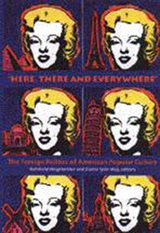
“Here, There and Everywhere”
The Foreign Politics of American Popular Culture
Reinhold Wagnleitner
University Press of New England, 2000
American popular culture is everywhere. All over the world, kids wear Levis, radios blare rap songs, television stations broadcast American programs, and Hollywood movies draw huge audiences. Does this massive "Americanization" of the globe represent some sinister form of cultural imperialism? Alternatively, do audiences and consumers in the importing countries accept American movies, music, and television programs because they match local trends and desires? Do receiving communities transform these products to fit their own needs, to the point where they are no longer "American" but in fact have become indigenous? And who is in charge of all of this, anyway? Is it Wall Street, Madison Avenue, the Pentagon, the CIA, or Hollywood? Is it, at least partly, local economic and political elites in the receiving countries? Or is it simply "the people," nationalities be damned? These are the questions at the heart of the essays collected in "Here, There and Everywhere." Essays by 23 authors from 14 countries cover topics from Japan to Spain, Nigeria to Russia, and from West Germany to East Germany (a distance that seemed to be further than travelling to the moon, yet was covered by rock 'n' roll most easily, despite the wall). In five sections, they examine the historical background, the impact of Hollywood, the power of American popular music from jazz to rock 'n' roll and rap, and the popularity of as well as resistance to American popular culture in particular countries.
[more]
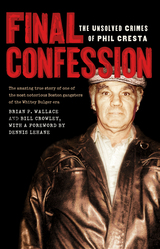
Final Confession
The Unsolved Crimes of Phil Cresta
Brian P. Wallace
University Press of New England, 2013
Phil Cresta was no run-of-the-mill thief. Mastermind of the legendary Brink's armored truck robbery and a string of countless other high-stakes heists, he stole more than ten million dollars in escapades that often were breathtakingly daring and at times marvelously inventive. The robberies baffled both police and fellow outlaws for decades, and most of the crimes remain unsolved today. Now the open case files of these memorable thefts can be closed as Cresta himself provides the true story on how they were planned and carried out. Born in Boston's North End in 1928, Cresta was raised in an abusive household. He was sent to Concord Reformatory as a teenager, where he learned the craft of picking locks, a skill later honed during stays at the Charlestown and Walpole prisons in Massachusetts. Following the Brinks robbery in 1968, he was put on the FBI's Ten Most Wanted List, but eluded the law for five years, living in Chicago under an assumed name. After serving time at Walpole for the Brinks job, Cresta died penniless in Chicago in 1995. Yet shortly before his death, he revealed the full extent of his astonishing capers to coauthor Bill Crowley, a retired Boston police detective. Drawing from their extensive conversations, this riveting page-turner chronicles how Cresta, along with partners "Angelo" and "Tony," pulled off robberies of jewelers, rare coin dealers, furriers, and armored trucks, detailing the meticulous planning that marked his criminal career. Cresta's final accounting is brimming with vivid tales of betrayal, murder, and intrigue as well as a colorful cast of characters, including mob bosses, wise guys, informants, paid "ears," corrupt judges, a Hollywood starlet, and even the Mayor of Chicago. Filled with drama, tension, and humor, this absorbing saga takes the reader inside the dangerous yet exhilarating world of a life dedicated to crime.
[more]

Laughing Lost in the Mountains
Poems of Wang Wei
Wang
University Press of New England, 1992
Wang Wei was one of the most celebrated poets of China's Tang Dynasty (618-907). An influential painter and practitioner of Chan (Zen) Buddhism, many of his poems contain concise and evocative descriptions of nature whose elegant minimalism offers subtle expression of a transcendence from everyday life. While this purity of poetic expression is what Wang Wei's reputation is built upon, he lived a courtly life of highs and lows in a tumultuous era, suffering demotions and exile, imprisonment and rehabilitation, all of which are evidenced in his verse. Wang Wei's poems grapple with the trappings of worldly life and the quest for enlightenment, painting a complex picture of both his psyche and his Chan discipline. Laughing Lost in the Mountains includes translations of poems running the spectrum of Wang Wei's subjects, as well as an extensive introduction that sheds light on Wang Wei's craft, spirituality, and historical context.
[more]
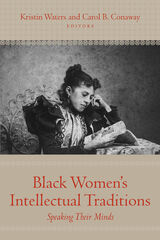
Kristin B. Waters
University Press of New England
An astonishing wealth of literary and intellectual work by nineteenth-century black women is being rediscovered and restored to print in scholarly and popular editions. In Kristin Waters’s and Carol B. Conaway’s landmark edited collection, Black Women’s Intellectual Traditions: Speaking Their Minds, sophisticated commentary on this rich body of work chronicles a powerful and interwoven legacy of activism based in social and political theories that helped shape the history of North America. The book meticulously reclaims this American legacy, providing a collection of critical analyses of the primary sources and their vital traditions. Written by leading scholars, Black Women’s Intellectual Traditions is particularly powerful in its exploration of the pioneering thought and action of the nineteenth-century black woman lecturer and essayist Maria W. Stewart, abolitionist Sojourner Truth, novelist and poet Frances Ellen Watkins Harper, educator Anna Julia Cooper, newspaper editor Mary Ann Shadd Cary, and activist Ida B. Wells. The distinguished contributors are Hazel V. Carby, Patricia Hill Collins, Karen Baker-Fletcher, Kristin Waters, R. Dianne Bartlow, Carol B. Conaway, Olga Idriss Davis, Vanessa Holford Diana, Evelyn Simien, Janice W. Fernheimer, Michelle N. Garfield, Joy James, Valerie Palmer-Mehta, Carla L. Peterson, Marilyn Richardson, Evelyn M. Simien, Ebony A. Utley, Mary Helen Washington, Melina Abdullah, and Lena Ampadu. The volume will interest scholars and readers of African-American and women’s studies, history, rhetoric, literature, poetry, sociology, political science, and philosophy.
[more]
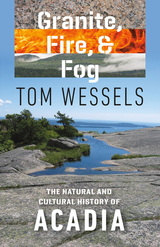
Granite, Fire, and Fog
The Natural and Cultural History of Acadia
Tom Wessels
University Press of New England, 2017
Acadia National Park, on Maine’s Mount Desert Island, is among the most popular national parks in the United States. From the road, visitors can experience magnificent vistas of summit and sea, but on a more intimate scale, equally compelling views abound along Acadia’s hiking trails. Tom Wessels, an ecologist, naturalist, and avid hiker, attributes the park’s popularity—and its unusual beauty—to the unique way in which earth, air, fire, and water—in the form of glacially scoured granite, winter winds, fire, and ocean fog—have converged to create a landscape that can be found nowhere else. In this beautifully illustrated book, Wessels invites readers to investigate the remarkable natural history of Mount Desert Island, along with the unique cultural story it gave rise to. This account of nature, terrain, and human interaction with the landscape will delight those who like to hike these bald summits, ride along the carriage roads, or explore the island’s rugged shoreline. Wessels concludes with a guided tour of one of his favorite hikes, a ten-mile loop that will acquaint the reader with the diverse ecosystems described throughout his book.
[more]
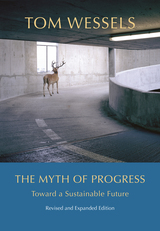
The Myth of Progress
Toward a Sustainable Future
Tom Wessels
University Press of New England, 2013
In this compelling and cogently argued book, Tom Wessels demonstrates how our current path toward progress, based on continual economic expansion and inefficient use of resources, runs absolutely contrary to three foundational scientific laws that govern all complex natural systems. It is a myth, he contends, that progress depends on a growing economy. Wessels explains his theory with his three laws of sustainability: (1) the law of limits to growth, (2) the second law of thermodynamics, which exposes the dangers of increased energy consumption, and (3) the law of self-organization, which results in the marvelous diversity of such highly evolved systems as the human body and complex ecosystems. These laws, scientifically proven to sustain life in its myriad forms, have been cast aside since the eighteenth century, first by Western economists, political pragmatists, and governments attracted by the idea of unlimited growth, and more recently by a global economy dominated by large corporations, in which consolidation and oversimplification create large-scale inefficiencies in both material and energy usage. Wessels makes scientific theory readily accessible by offering examples of how the laws of sustainability function in the complex systems we can observe in the natural world around us. He shows how systems such as forests can be templates for developing sustainable economic practices that will allow true progress. Demonstrating that all environmental problems have their source in a disregard for the laws of sustainability that is based on the myth of progress, he concludes with an impassioned argument for cultural change.
[more]
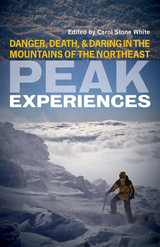
Peak Experiences
Danger, Death, and Daring in the Mountains of the Northeast
Carol Stone White
University Press of New England, 2012
In the mountains, the difference between a pleasant day of hiking and a life-threatening disaster is as simple as a loose rock, a turned ankle, or a misjudged patch of ice. In an instant, even the most experienced and prepared of outdoorspersons can find themselves at the mercy of the elements (and their own choices) — and suddenly, sometimes tragically, the situation slips out their control. In this collection of over fifty tales of day hikes and long treks gone awry, the seasoned climber and writer Carol Stone White brings together some of her favorite tales of outdoor misadventure written by colleagues and fellow enthusiasts who have experienced the harsher side of climbing the peaks of New England and the Adirondacks. From freak falls to outrunning storms, from life-threatening hypothermia to the excitement of unlikely rescues, these tales inform as much as they entertain, teaching even the experienced climber that accidents can happen to anyone and that preparation and the ability to make split-second decisions can often mean the difference between life and death. Like sitting around the campfire sharing tales of terror and near death with your hiking buddies, this collection will appeal to the true outdoorsperson as well as the armchair adventurer.
[more]
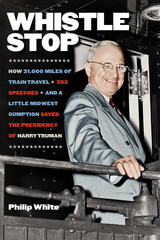
Whistle Stop
How 31,000 Miles of Train Travel, 352 Speeches, and a Little Midwest Gumption Saved the Presidency of Harry Truman
Philip White
University Press of New England, 2015
President Harry Truman was a disappointment to the Democrats, and a godsend to the Republicans. Every attempt to paint Truman with the grace, charm, and grandeur of Franklin Delano Roosevelt had been a dismal failure: Truman’s virtues were simpler, plainer, more direct. The challenges he faced—stirrings of civil rights and southern resentment at home, and communist aggression and brinkmanship abroad—could not have been more critical. By the summer of 1948 the prospects of a second term for Truman looked bleak. Newspapers and popular opinion nationwide had all but anointed as president Thomas Dewey, the Republican New York Governor. Truman could not even be certain of his own party’s nomination: the Democrats, still in mourning for FDR, were deeply riven, with Henry Wallace and Strom Thurmond leading breakaway Progressive and Dixiecrat factions. Finally, with ingenuity born of desperation, Truman’s aides hit upon a plan: get the president in front of as many regular voters as possible, preferably in intimate settings, all across the country. To the surprise of everyone but Harry Truman, it worked. Whistle Stop is the first book of its kind: a micro-history of the summer and fall of 1948 when Truman took to the rails, crisscrossing the country from June right up to Election Day in November. The tour and the campaign culminated with the iconic image of a grinning, victorious Truman holding aloft the famous Chicago Tribune headline: “Dewey Defeats Truman.”
[more]
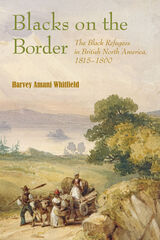
Blacks on the Border
The Black Refugees in British North America, 1815–1860
Harvey Whitfield
University Press of New England, 2006
Following the American Revolution, free black communities and enslaved African Americans increasingly struggled to reconcile their African heritage with their American home. This struggle resulted in tens of thousands of African Americans seeking new homes in areas as diverse as Haiti and Nova Scotia. Black refugees arrived in Nova Scotia after the War of 1812 with little in common but their desire for freedom. By 1860, they had formed families, communities, and traditions. Harvey Amani Whitfield’s study reconstructs the lives and history of a sizeable but neglected group of African Americans by placing their history within the framework of free black communities in New England and Nova Scotia during the nineteenth century. It examines which aspects of American and African American culture black expatriates used or discarded in an area that forced them to negotiate the overlapping worlds of Great Britain, the United States, Afro–New England, and the African American Diaspora, while considering how former American slaves understood freedom long before the Civil War.
[more]
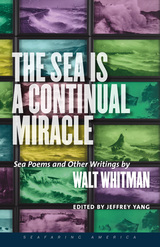
The Sea Is a Continual Miracle
Sea Poems and Other Writings by Walt Whitman
Walt Whitman
University Press of New England, 2017
From his earliest days on Long Island and in New York City to his last years in Camden, New Jersey, Walt Whitman lived close to the sea he knew and loved. The “liquid-flowing syllables” of Whitman’s poetry and prose tell specific stories of particular voyages and known shores, as well as vivid flights of imagination and keening paeans to wild winds, dark water, stormy and quiet airs. The land, for Whitman, is both immutable and still, while the sea is a realm of dynamic change, mercurial temper, and the ebb and flow of cosmic uncertainty. From “Mannahatta” to “Poem of Joys” to the magisterial ode to the slain President Lincoln, “O Captain! My Captain!” Whitman wove the strands of nautical lexicon and powerful imagery into the tapestry of our national literature. In The Sea Is a Continual Miracle, poet and editor Jeffrey Yang has compiled an invaluable resource for readers, students, and scholars of Whitman, and demonstrates how seeing him through sea glass shows America’s best-loved poet in a new light.
[more]
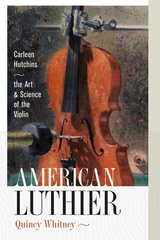
Quincy Whitney
University Press of New England
From the time of Stradivari, the mysterious craft of violinmaking has been a closely guarded, lucrative, and entirely masculine preserve. In the 1950s Carleen Maley Hutchins was a grade school science teacher, amateur trumpet player, and New Jersey housewife. When musical friends asked her to trade a trumpet for a $75 viola, she decided to try making one, thus setting in motion a surprising career. A self-taught genius who went head to head with a closed and ancient guild, Hutchins carved nearly 500 stringed instruments over the course of half a century and collaborated on more than 100 experiments in violin acoustics. In answer to a challenge from a composer, she built the first violin octet—a family of eight violins ranging in size from an eleven-inch treble to a seven-foot contrabass, and in register across the gamut of the piano keyboard. She wrote more than 100 technical papers—including two benchmark Scientific American cover articles—founded an international society devoted to violin acoustics, and became the only American and the only woman to be honored in Cremona, Italy, the birthplace of Stradivari. Hutchins died in 2009 at the age of ninety-eight. The most innovative violinmaker of the modern age, she set out to explore two worlds she knew virtually nothing about—violins and acoustical physics. American Luthier chronicles the life of this unsung woman who altered everything in a world that had changed little in three centuries.
[more]

Christian Wiese
University Press of New England
Hans Jonas (1903–1993) is one of the most important philosophers of the 20th century. Born in a German Jewish community in the Rhineland, Jonas’s mentors included Edmund Husserl, Martin Heidegger, and Rudolf Bultmann. The committed Zionist fled Germany in 1933 for Jerusalem, fought in the British Army against Hitler, and then left Israel for North America in 1949. Much of Jonas’s philosophy responds to contemporary historical and political challenges: mass society, totalitarianism, the Holocaust, “nuclearism,” environmental devastation (Chernobyl), and, later, the risks of genetic engineering. Wiese’s study examines how Jonas’s Jewish background influenced his intellectual development. Wiese shows how philosophical ethics and Jewish identity were two inseparable aspects of his thinking, with the fight against Nihilism as the most important link. Drawing on a wealth of unpublished material and exploring momentous encounters with major figures of 20th century life and letters like Gershom Scholem and Hannah Arendt, Wiese demonstrates how Jonas combined religious and philosophical elements in his thought, and offers new insights into the work of this eminent thinker.
[more]

Inferno in Chechnya
The Russian-Chechen Wars, the Al Qaeda Myth, and the Boston Marathon Bombings
Brian Glyn Williams
University Press of New England, 2015
In 2013, the United States suffered its worst terrorist bombing since 9/11 at the annual running of the Boston Marathon. When the culprits turned out to be U.S. residents of Chechen descent, Americans were shocked and confused. Why would members of an obscure Russian minority group consider America their enemy? Inferno in Chechnya is the first book to answer this riddle by tracing the roots of the Boston attack to the Caucasus Mountains of southern Russia. Brian Glyn Williams describes the tragic history of the bombers’ war-devastated homeland—including tsarist conquest and two bloody wars with post-Soviet Russia that would lead to the rise of Vladimir Putin—showing how the conflict there influenced the rise of Europe’s deadliest homegrown terrorist network. He provides a historical account of the Chechens’ terror campaign in Russia, documents their growing links to Al Qaeda and radical Islam, and describes the plight of the Chechen diaspora that ultimately sent two Chechens to Boston. Inferno in Chechnya delivers a fascinating and deeply tragic story that has much to say about the historical and ethnic roots of modern terrorism.
[more]

The Voice of the Dawn
An Autohistory of the Abenaki Nation
Frederick Matthew Wiseman
University Press of New England, 2001
"[My] story is a sash woven of many strands of language. The first strand is the remembered wisdom of the Abenaki community. The second strand is our history and that of our relatives, written down by European, Native American, and Euroamerican observers. The third strand is what our Mother the Earth has revealed to us through the studies and writings of those who delve in her, the archaeologists and paleoecologists. The fourth strand is my own family history and its stories. The fifth strand is, of course, that which has come to me alone, stories which I create with my own beliefs and visions." So begins the first book about Abenaki history and culture written from the inside. Frederick Matthew Wiseman's extensive research and personal engagement breathe life into Voice of the Dawn, making it truly unique. Colin Calloway, Chair of Native American Studies at Dartmouth College, writes, "Going beyond all previous works on the Abenakis, Wiseman draws on family and community knowledge in a way that none of those authors could, speaks from an avowedly Abenaki perspective, and addresses aspects and issues ignored in other works. Moreover, no one that I know of has done as much work in locating and regathering items of Western Abenaki material culture. The quality and quantity of illustrations alone make this an attractive book, as well as a valuable visual record of change and persistence over time. As someone personally and pivotally involved in the Abenaki renaissance, Wiseman brings the story up to date without closing it."
[more]
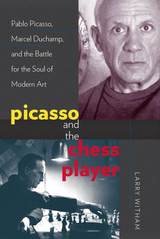
Picasso and the Chess Player
Pablo Picasso, Marcel Duchamp, and the Battle for the Soul of Modern Art
Larry Witham
University Press of New England, 2013
In the fateful year of 1913, events in New York and Paris launched a great public rivalry between the two most consequential artists of the twentieth century, Pablo Picasso and Marcel Duchamp. The New York Armory Show art exhibition unveiled Duchamp’s Nude Descending a Staircase, a “sensation of sensations” that prompted Americans to declare Duchamp the leader of cubism, the voice of modern art. In Paris, however, the cubist revolution was reaching its peak around Picasso. In retrospect, these events form a crossroads in art history, a moment when two young bohemians adopted entirely opposite views of the artist, giving birth to the two opposing agendas that would shape all of modern art. Today, the museum-going public views Pablo Picasso as the greatest figure in modern art. Over his long lifetime, Picasso pioneered several new styles as the last great painter in the Western tradition. In the rarefied world of artists, critics, and collectors, however, the most influential artist of the last century was not Picasso, but Marcel Duchamp: chess player, prankster, and a forefather of idea-driven dada, surrealism, and pop art. Picasso and the Chess Player is the story of how Picasso and Duchamp came to define the epochal debate between modern and conceptual art—a drama that features a who’s who of twentieth-century art and culture, including Henri Matisse, Gertrude Stein, André Breton, Salvador Dalí, and Andy Warhol. In telling the story, Larry Witham weaves two great art biographies into one tumultuous century.
[more]

Tell
Love, Defiance, and the Military Trial at the Tipping Point for Gay Rights
Major Margaret Witt
University Press of New England, 2017
In 1993 Margie Witt, a young Air Force nurse, was chosen as the face of the Air Force’s “Cross into the Blue” recruitment campaign. This was also the year that President Clinton’s plan for gays to serve openly in the military was quashed by an obdurate Congress, resulting in the blandly cynical political compromise known as Don’t Ask, Don’t Tell. Contrary to its intent, DADT had the perverse effect of making it harder for gay servicemen and -women to fight expulsion. Over the next seventeen years more than 13,000 gay soldiers, sailors, marines, coast guard, and airmen and -women were removed from military service. That is, until Margie Witt’s landmark case put a stop to it. Tell is the riveting story of Major Margaret Witt’s dedicated and decorated military career as a frontline flight nurse, and of her love and devotion to her partner—now wife—Laurie Johnson. Tell captures the tension and drama of the politically charged legal battle that led to the congressional repeal of the controversial law and helped pave the way for a suite of landmark political and legal victories for gay rights. Tell is a testament to the power of love to transform hearts and minds, as well as a celebration of the indomitable spirit of Major Witt, her wife Laurie, her dedicated legal team, and the brave men and women who came forward to testify on her behalf in a historic federal trial. “The name Margaret Witt may join the canon of US civil rights pioneers.” —Guardian “Major Witt’s trial provided an unparalleled opportunity to attack the central premise of [Don’t Ask, Don’t Tell] . . . and set an important precedent.”— New York Times “A landmark ruling.”—Politico
[more]
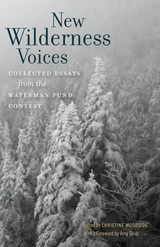
New Wilderness Voices
Collected Essays from the Waterman Fund Contest
Christine Woodside
University Press of New England, 2017
Guy and Laura Waterman spent a lifetime reflecting on and writing about the mountains of the Northeast. The Waterman Fund seeks to further their legacy of stewardship through an annual essay contest that celebrates and explores issues of wilderness, wildness, and humanity. Since 2008, the Waterman Fund has partnered with the journal Appalachia in seeking out new and emerging voices on these subjects, and in publishing the winning essay in the journal. Part of the contest’s mission is to find and support such emerging writers, and a number of them have gone on to publish other work in Appalachia or their own books. The contest has succeeded admirably in fulfilling its mission: new writers have brought fresh perspectives to these timeless issues of wilderness and wildness. In New Wilderness Voices these winning essays are collected for the first time, along with the best runners-up. Together, they make up an important and celebratory addition to the growing body of environmental literature, and shed new light on our wild spaces.
[more]
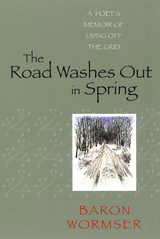
Baron Wormser
University Press of New England
For nearly twenty-five years, poet Baron Wormser and his family lived in a house in Maine with no electricity or running water. They grew much of their own food, carried water by hand, and read by the light of kerosene lamps. They considered themselves part of the “back to the land” movement, but their choice to live off the grid was neither statement nor protest: they simply had built their house too far from the road and could not afford to bring in power lines. Over the years, they settled in to a life that centered on what Thoreau called “the essential facts.” In this graceful meditation, Wormser similarly spurns ideology in favor of observation, exploration, and reflection. “When we look for one thread of motive,” he writes, “we are, in all likelihood, deceiving ourselves.” His refusal to be satisfied with the obvious explanation, the single thread of motive, makes him a keen and sympathetic observer of his neighbors and community, a perceptive reader of poetry and literature, and an honest and unselfconscious analyst of his own responses to the natural world. The result is a series of candid personal essays on community and isolation, nature, civilization, and poetry.
[more]
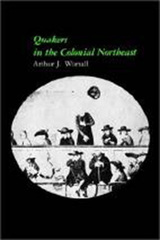
Quakers in the Colonial Northeast
Arthur J. Worrall
University Press of New England, 2002
This book traces the Quaker experience in New England and New York from the Arrival of the first English Quaker missionaries in 1646 to 1790. The first Friends faced considerable hostility, so much so that it took almost eighty years for Quakers and their antagonists to solve their differences. By then, Quakers had settled into a comfortable period of numerical increase, and, to the extent that colonies permitted, participated as individuals in colonial political life. During the early eighteenth century Quaker organizational and disciplinary structures derived from the late seventeenth century underwent gradual evolution, but not to the extent of altering the basically comfortable arrangement that served to promote the growth of Friends. After 1750, however, Quakers throughout the colonies entered a period of reform, a reform that led to a numerical decline in older centers and to a drastic reduction in numerical growth. Reform ultimately caused Friends to sharpen their positions on antislavery and pacifism and led to a withdrawal from political participation. Ultimately, it pointed the way to the disastrous nineteenth-century Quaker schisms.
[more]
READERS
Browse our collection.
PUBLISHERS
See BiblioVault's publisher services.
STUDENT SERVICES
Files for college accessibility offices.
UChicago Accessibility Resources
home | accessibility | search | about | contact us
BiblioVault ® 2001 - 2024
The University of Chicago Press









